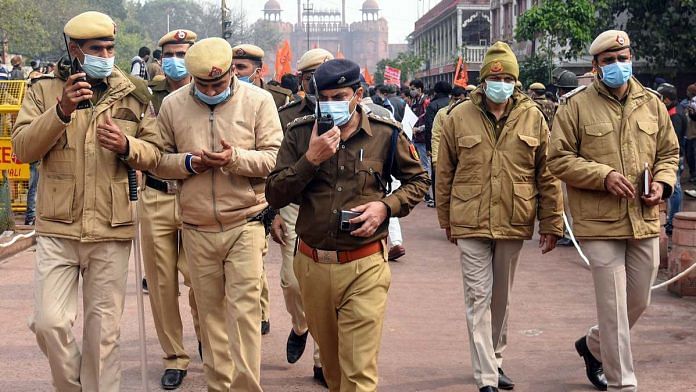New Delhi: The Delhi Police Special Cell has three IPS officers as Deputy Commissioners of Police (DCPs) for the first time in 31 years.
Since 1990, only DANIPS (Delhi, Andaman and Nicobar Police Service) officers had held the position of DCP in the Special Cell, which was set up in 1986 to prevent, detect and investigate cases of terrorism, organised crime and other serious offences in the national capital.
IPS officers Jasmeet Singh (2009 batch), Ingit Pratap Singh (2011 batch) and Rajeev Ranjan (2010 batch) took charge as Special Cell DCPs earlier this month. Along with the three existing DANIPS officers — P.S. Kushwah, Manishi Chandra and Sanjeev Yadav — the Special Cell will now have six DCPs.
Speaking to ThePrint about these appointments, Delhi Police Commissioner Rakesh Asthana said the IPS officers will bring in new ideas. In the present scenario, where narco terror and organised crime are on the rise, he added, it is a well thought-out move.
“IPS officers have their own vision, new ideas and will definitely get a new perspective, given their wide experiences. They are also very well trained, are good leaders and man managers,” he said.
“In the current scenario, including developments in Afghanistan, terror and organised crime are on the rise and a special unit for narco terror and organised crime was required, which will be led by these IPS officers,” he added.
Asthana said the existing DANIPS officers will continue in their positions and this change will only add “a new dimension to the Special Cell”.
Also Read: Delhi riots a ‘conspiracy’, important to review cases, police chief Rakesh Asthana says
Why only DANIPS officers held this position
The Special Cell was an offshoot of the Delhi Police Special Branch. It was created in light of the militancy in Punjab. According to senior officers, after the 1984 assassination of PM Indira Gandhi, a need was felt to create a unit to deal with extremism in Punjab and other terror-related cases.
The Delhi Police Special Branch had two divisions — SB-1 and SB-2. While SB-1 was responsible for VVIP security, intelligence gathering and registration of Pakistani nationals visiting India, SB-2 looked at cases of terror, made interceptions, and worked closely with intelligence agencies. It is SB-2 that was renamed Special Cell in 1986.
Asked why an IPS officer was not appointed as DCP in the Special Cell for so long, a senior police officer said it was a policy decision taken by the commissioner. However, the officer added, one possible explanation is that an IPS officer stays in a posting for 2.5 to 3 years, which may be too few for a unit like the Special Cell.
Although there is no fixed tenure for either an IPS or DANIPS officer, the latter gets to spend more time in Delhi as they can only get posted to five other locations — Daman and Diu, Dadra and Nagar Haveli, Lakshadweep, Chandigarh, and Andaman and Nicobar Islands, all of which have limited vacancies. In their entire career, they get at least two hard postings to any of these two UTs, and spend the rest of their career in Delhi. So, they stay in specialised units for longer.
An IPS officer, meanwhile, is transferred and promoted more often.
For instance, an IPS officer of the AGMUT cadre can get transferred to any union territory, as well as the states of Arunachal Pradesh, Goa and Mizoram.
An IPS officer can get five to six promotions over a 35-year career — from assistant commissioner to commissioner of police — while for DANIPS, it is a maximum of four, sometimes five promotions (depending upon age of joining service), from assistant commissioner to joint commissioner, and special commissioner in a few cases.
“The Special Cell was created to deal with cases of terrorism. It does intelligence gathering, builds assets, embeds them, is involved in several operations that even go on for two to three years. So, if an IPS officer is a DCP, he would have to leave the post after a fixed number of years, which is too short a tenure. For stability of tenure and to maintain continuity, DANIPS officers have been appointed to this post,” the officer quoted above said.
A second officer said the career progression of IPS officers does not allow them to “invest as many years as required for this unit”.
“It is not that DANIPS officers are any better or worse than IPS officers. It is just a question of developing those special skills required for this unit, like intelligence gathering, raids and asset-building,” the second officer said.
“Not that the IPS do not have the skills, but to build these, an officer has to be given time. For an IPS, by the time he or she develops those skills, becomes part of a network, it is time for them to join their next posting. Either they are transferred out of the unit, or sent out of Delhi,” the officer said.
(Edited by Sunanda Ranjan)
Also Read: When was Delhi Police founded? What is ‘dus numbri’? Retired IPS officer’s book has the answers



